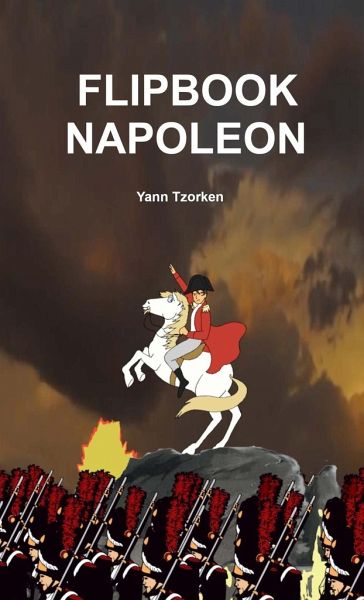
FLIPBOOK NAPOLEON

PAYBACK Punkte
10 °P sammeln!
FLIPBOOK NAPOLEON : ref 0012 collection, Napoleon, also Napoleon Bonaparte (born Napoleone Buonaparte; 15 August 1769 - 5 May 1821), and later known by his regnal name Napoleon I, was a French military and political leader who rose to prominence during the French Revolution and led several successful campaigns during the Revolutionary Wars. He was the de facto leader of the French Republic as First Consul from 1799 to 1804, and as Napoleon I, he was Emperor of the French from 1804 until 1814 and again in 1815. Napoleon's political and cultural legacy has endured to this day, and he stands as o...
FLIPBOOK NAPOLEON : ref 0012 collection, Napoleon, also Napoleon Bonaparte (born Napoleone Buonaparte; 15 August 1769 - 5 May 1821), and later known by his regnal name Napoleon I, was a French military and political leader who rose to prominence during the French Revolution and led several successful campaigns during the Revolutionary Wars. He was the de facto leader of the French Republic as First Consul from 1799 to 1804, and as Napoleon I, he was Emperor of the French from 1804 until 1814 and again in 1815. Napoleon's political and cultural legacy has endured to this day, and he stands as one of the most celebrated and controversial leaders in world history. Napoleon was born on the island of Corsica, not long after its annexation by France, to a native family descending from minor Italian nobility. He supported the French Revolution in 1789 while serving in the French army, and tried to spread its ideals to his native Corsica. He rose rapidly in the Army after he saved the governing French Directory by firing on royalist insurgents. In 1796, he began a military campaign against the Austrians and their Italian allies, scoring decisive victories and becoming a national hero. Two years later, he led a military expedition to Egypt that served as a springboard to political power. He engineered a coup in November 1799 and became First Consul of the Republic. Differences with the United Kingdom meant that the French faced the War of the Third Coalition by 1805. Napoleon shattered this coalition with victories in the Ulm Campaign, and at the Battle of Austerlitz, which led to the dissolution of the Holy Roman Empire. In 1806, the Fourth Coalition took up arms against him because Prussia became worried about growing French influence on the continent. Napoleon defeated Prussia at the battles of Jena and Auerstedt, marched the Grande Armée into Eastern Europe, and defeated the Russians in June 1807 at Friedland, forcing the defeated nations of the Fourth Coalition to accept the Treaties of Tilsit. Two years later, the Austrians challenged the French again during the War of the Fifth Coalition, but Napoleon solidified his grip over Europe after triumphing at the Battle of Wagram.












